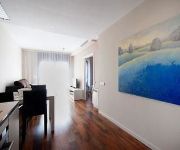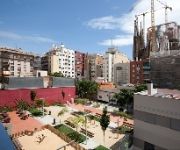Safety Score: 3,0 of 5.0 based on data from 9 authorites. Meaning we advice caution when travelling to Spain.
Travel warnings are updated daily. Source: Travel Warning Spain. Last Update: 2024-04-23 08:18:23
Explore el Camp d'en Grassot i Gràcia Nova
The district el Camp d'en Grassot i Gràcia Nova of in Barcelona (Catalonia) with it's 34,356 inhabitants el Camp d'en Grassot i Gràcia Nova is located in Spain about 314 mi east of Madrid, the country's capital.
If you need a place to sleep, we compiled a list of available hotels close to the map centre further down the page.
Depending on your travel schedule, you might want to pay a visit to some of the following locations: Barcelona, Ripollet, Badalona, Sant Just Desvern and Sant Cugat del Valles. To further explore this place, just scroll down and browse the available info.
Local weather forecast
Todays Local Weather Conditions & Forecast: 14°C / 58 °F
| Morning Temperature | 10°C / 51 °F |
| Evening Temperature | 11°C / 52 °F |
| Night Temperature | 11°C / 52 °F |
| Chance of rainfall | 8% |
| Air Humidity | 53% |
| Air Pressure | 1014 hPa |
| Wind Speed | Fresh Breeze with 15 km/h (9 mph) from North-East |
| Cloud Conditions | Few clouds, covering 20% of sky |
| General Conditions | Moderate rain |
Wednesday, 24th of April 2024
14°C (56 °F)
14°C (56 °F)
Sky is clear, gentle breeze, clear sky.
Thursday, 25th of April 2024
12°C (54 °F)
13°C (55 °F)
Light rain, moderate breeze, overcast clouds.
Friday, 26th of April 2024
12°C (53 °F)
13°C (56 °F)
Moderate rain, light breeze, overcast clouds.
Hotels and Places to Stay
Aparthotel Hispanos 7 Suiza
Catalonia La Pedrera
Ayre Hotel Rosellon
Milà Apartamentos Barcelona
Le Palacete Relais du silence
Gran de Gràcia Apartments
Sagrada Familia Apartamentos
Well and Come
Zoilo Apartments Sagrada Familia
Dailyflats Gracia
Videos from this area
These are videos related to the place based on their proximity to this place.
The Modernist Hospital de Sant Pau in Barcelona
Jessica Bowler takes us to visit one of the jewels of the modernist movement in Barcelona - the Hospital de Sant Pau. It's also one of the lesser-known works in the city, despite being the...
Districts of Barcelona
The City of Barcelona is divided into 10 administrative districts each with its own Ajuntament. The city centre districts of Ciutat Vella and L'Eixample along with Sants-Montjuïc, Gràcia...
Milestones | Fites | Hitos 2014-2015
[EN] 2014-2015 Milestones: sacristy, raking cornice and stained glass windows --- [CA] Fites 2014-2015: sagristia, cimaci i vitralls --- [ES] Hitos 2014-2015: sacristía, cimacio y vitrales.
2026 Completion of the Basilica | 2026 Acabem la Basílica | 2026 Se finaliza la Basílica (3D)
[EN] Watch the development of what remains to be completed on the Sagrada Familia. Construction, started by the architect Antoni Gaudí in 1883, is expected to be finished with the completion...
La Sagrada Familia, Antoni Gaudi
El Templo Expiatorio de la Sagrada Familia, conocido simplemente como la Sagrada Familia, es un gran templo católico de Barcelona (España), diseñado por el arquitecto catalán Antoni Gaudí....
La Sagrada Familia by Antoni Gaudi in Barcelona.
The Sagrada Familia in Barcelona by Antoni Gaudí. Gaudi's greatest creation the giant Basilica in Barcelona. The construction started in 1882 and is still being built today. By http://www.barcelon...
2014 Merry Christmas | Bon Nadal | Feliz Navidad
[EN] We wish you and your family a merry Christmas and a happy new year 2015! Video produced by Montenegro Media in collaboration with Vent del Nord, La Fuga, Sinera and Virolet choirs, from...
Down the Sagrada Familia Passion Tower Spiral Staircase
What it feels like to walk down the spiraling staircase into the main area.
Visitar Sagrada Familia / Visit Holy Family - Turismo Barcelona tourism, travel, tour, Spain Gaudí
http://www.tusdestinos.net Templo de la Sagrada Familia de Barcelona Holy Family / Time-lapse Con el soporte audiovisual: http://www.tomcomvideo.com.
Da una torre della Sagrada Familia...(A tower of the Sagrada Familia)
Breve filmato che descrive la discesa da una torre della "Facciata Della Passione" della Sagrada Familia di Barcellona. (Short video describing the descent from a tower of "Facade of the Passion"...
Videos provided by Youtube are under the copyright of their owners.
Attractions and noteworthy things
Distances are based on the centre of the city/town and sightseeing location. This list contains brief abstracts about monuments, holiday activities, national parcs, museums, organisations and more from the area as well as interesting facts about the region itself. Where available, you'll find the corresponding homepage. Otherwise the related wikipedia article.
Casa Milà
Casa Milà, better known as La Pedrera (meaning the 'The Quarry'), is a building designed by the Catalan architect Antoni Gaudí and built during the years 1906–1912. It is located at 92, Passeig de Gràcia (passeig is Catalan for promenade) in the Eixample district of Barcelona, Catalonia, Spain.
Sagrada Família
The Basílica i Temple Expiatori de la Sagrada Família, commonly known as the Sagrada Família, is a large Roman Catholic church in Barcelona, Catalonia, Spain, designed by Catalan architect Antoni Gaudí (1852–1926). Although incomplete, the church is a UNESCO World Heritage Site, and in November 2010 was consecrated and proclaimed a minor basilica by Pope Benedict XVI.
Barcelonès
Barcelonès is the most economically important comarca (county) of Catalonia, Spain. Its capital is Barcelona, which is also the capital of Catalonia.
Hospital de Sant Pau
The former Hospital de la Santa Creu i Sant Pau (English: Hospital of the Holy Cross and Saint Paul) in the neighborhood of El Guinardó, Barcelona, Catalonia, Spain, is a complex built between 1901 and 1930, designed by the Catalan modernist architect Lluís Domènech i Montaner. Together with Palau de la Música Catalana, it is a UNESCO World Heritage Site. It was a fully functioning hospital until June 2009, it is currently undergoing restoration for use as a museum and cultural center.
Gràcia
Gràcia is a district of the city of Barcelona, Catalonia, Spain. It comprises the neighborhoods of Vila de Gràcia, Vallcarca i els Penitents, El Coll, La Salut and Camp d'en Grassot i Gràcia Nova. Gràcia is bordered by the districts of Eixample to the south, Sarrià-Sant Gervasi to the west and Horta-Guinardó to the east. It's numbered District 6. In 2005, Gràcia had 120,087 inhabitants, according to the Instituto Nacional de Estadística.
Avinguda Diagonal
Avinguda Diagonal is the name of one of Barcelona's broadest and most important avenues. It cuts the city in two, diagonally from west to east (by Barcelona's compass), hence the name. It was originally projected by engineer and urban planner Ildefons Cerdà as one of the city's wide avenues, which along with Avinguda Meridiana would cut the rationalist grid he designed for l'Eixample. Both would meet at Plaça de les Glòries Catalanes, which Cerdà envisioned as the new city centre.
Horta-Guinardó
Horta-Guinardó is the name of one of the districts of Barcelona, located in its North-Eastern corner. It is named after two very heterogeneous areas of the city, Horta and el Guinardó, which together cover a large area of 11.92 km², which sums up for the 11,9% of the total extension of the city.
Provença-Diagonal station
Provença is the name of a Ferrocarrils de la Generalitat de Catalunya station located under Avinguda Diagonal and Balmes street. The station is served by FGC-operated Barcelona Metro lines L6 and L7, and Metro del Vallès suburban metro lines S1, S2, S5 and S55. Diagonal is the name of an important station in TMB-operated Barcelona Metro network. It is named after Avinguda Diagonal, where the station is located together with Passeig de Gràcia.
Alfons X (Barcelona Metro)
Alfons X is a Barcelona metro station, located under Ronda Guinardó and Plaça d'Alfons el Savi, named after Alfonso X of Castile, in the Horta-Guinardó district of Barcelona. Opened in 1974, the station is currently served by L4. It has three entrances, one on the square itself, a second one next to Parc de les Aigües and another one on Carrer Lepant. As of 2007 it is the only metro service in the surrounding area, and will be until Sanllehy metro station on L9 and L10 is complete.
Passeig de Sant Joan, Barcelona
Passeig de Sant Joan is a major avenue in the Eixample and Gràcia districts of Barcelona. It was named after an older street carrying this name, also known as Passeig Nou, built in 1795 around the glacis of the Ciutadella fortress.
Verdaguer (Barcelona Metro)
Verdaguer is a station in the Barcelona metro network, located under Plaça de Mossèn Jacint Verdaguer, in Eixample, named after the Catalan poet Jacint Verdaguer. It's served by L4 and L5. It was opened in 1970, as L4 was extended from Urquinaona towards Joanic. The L5 part of the station opened in 1973. It can be accessed from Carrer de Provença, Avinguda Diagonal, Carrer de Girona and Passeig de Sant Joan. It was known as General Mola until 1982.
Sagrada Família metro station
Sagrada Família is the name of a metro station in Barcelona Metro network. It is named after the famous church of the same name, first designed by architect Antoni Gaudí and still under construction. It is served by TMB-operated Barcelona Metro lines L2 and L5. Barcelona Metro line 2 station was opened in 1995 with the opening of the line between Sant Antoni and this station.
Sant Pau – Dos de Maig (Barcelona Metro)
Sant Pau | Dos de Maig is a station on L5 of the Barcelona Metro. Named for the Hospital de Sant Pau World Heritage Site which it serves, the station is located underneath Carrer Indústria in the Eixample, between Carrer Cartagena and Carrer Dos de Maig. It was opened in 1970. Its previous name, before 2009, was Hospital de Sant Pau. The separate-platform station has a ticket hall on either end, each with one access, on Carrer Cartagena and Carrer Dos de Maig.
Travessera de Gràcia
Travessera de Gràcia is a street in Barcelona named after Gràcia, a district it crosses, even though it also spans two other districts. It starts in Plaça de Francesc Macià in Sarrià-Sant Gervasi and ends in Carrer de Cartagena in Horta-Guinardó, where one of the landmarks of the city, the Hospital de Sant Pau stands. Its central part follows the outline of a medieval road, Via Francisca, documented in 1057. Its current name was approved in 1932.
Girona (Barcelona Metro)
Girona is a Barcelona Metro station located in Carrer de Girona, underneath Carrer del Consell de Cent between Carrer del Bruc and Carrer de Bailèn, in Dreta de l'Eixample, part of the Eixample district of Barcelona. It is served by L4 (yellow line). The station was inaugurated in 1973 along with the other stations from Urquinaona to Joanic.
Guinardó – Hospital de Sant Pau (Barcelona Metro)
Guinardó | Hospital de Sant Pau (until 2009 Guinardó) is a station of the Barcelona Metro, on L4, serving Ronda del Guinardó and Plaça del Guinardó. It opened in 1974. The station is due to become part of double line L9-L10 in the near future.
Joanic (Barcelona Metro)
Joanic is a station of the Barcelona Metro network located in the district of Gràcia. It's served by L4. The station opened in 1973. It's located under carrer de Pi i Margall between Plaça Joanic and carrer de l'Alegre de Dalt, and it can be accessed either from the former or from carrer de l'Escorial.
Palau Robert
Palau Robert is a building on Barcelona's Passeig de Gràcia 107, the former private residence of Robert Robert i Surís, an influential aristocrat, politician and businessman at the turn of the 20th century. It's nowadays a government-run institution which hosts an exhibition centre with three halls, a concert hall, gardens as well as the Information Centre for Catalonia, including the city's tourism bureau.
Camp d'en Grassot i Gràcia Nova
El Camp d'en Grassot i Gràcia Nova is a neighborhood in the city of Barcelona in Catalonia in Spain. It is part of the district of Gràcia.
Siege of Barcelona (1705)
The Siege of Barcelona took place between 14 September and 19 October 1705 during the War of the Spanish Succession when an Allied army supporting the Austrian pretender to the Spanish throne led by Lord Peterborough captured the city of Barcelona from its Franco-Spanish Bourbonic defenders. An attempted landing had been repulsed the previous year at the Battle of Barcelona (1704).
Plaça de Mossèn Jacint Verdaguer, Barcelona
Plaça de Mossèn Jacint Verdaguer (colloquially Plaça Verdaguer or simply Verdaguer) is a square in the Eixample district of Barcelona, Catalonia, Spain. It lies in the intersection between Avinguda Diagonal, the city's main avenue, and Passeig de Sant Joan, in Dreta de l'Eixample, not far from the Sagrada Família.
Dreta de l'Eixample
Dreta de l'Eixample is a neighborhood in the Eixample district of Barcelona, Catalonia. It's located east (visualised as dreta or "right") of Carrer de Balmes. It includes Plaça de Catalunya, the centre of the city, and the upscale streets Rambla de Catalunya and Passeig de Gràcia as well as lower-middle class areas such as Fort Pienc, centered around Estació del Nord, Plaça de Tetuan and Passeig de Sant Joan or the Sagrada Família neighbourhood.
Plaça de Tetuan, Barcelona
Plaça de Tetuan is a major square in Barcelona. It is in Fort Pienc, in the central district of Eixample, at the busy intersection of Gran Via de les Corts Catalanes and Passeig de Sant Joan. The square is named after the siege and occupation of the Moroccan city of Tetuan by general Joan Prim and Catalan volunteers. It was formerly called Hermenegildo Giner de los Ríos.
Boixos Nois
The Boixos Nois is an ultras supporter group organised around the football club FC Barcelona, based in the Spanish autonomous community Catalonia. Founded in 1982 it was composed of left-leaning Catalan nationalists, until a surge of skinheads joining in the mid-1980s saw the political orientation turn from socialistic to far-right Catalan separatism and to far-right Spanish nationalism as well.
Municipal Conservatory of Barcelona
The Municipal Conservatory of Barcelona is a teaching institution, which is devoted to music education. The present ownership belongs to the Barcelona City Hall.




























